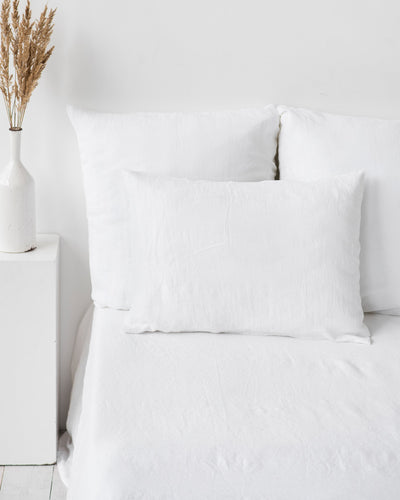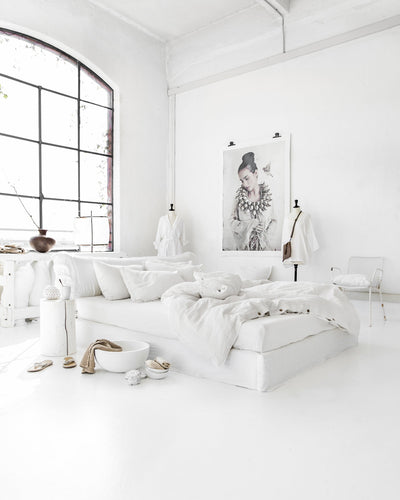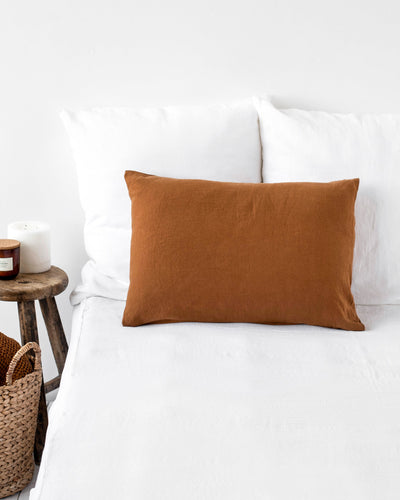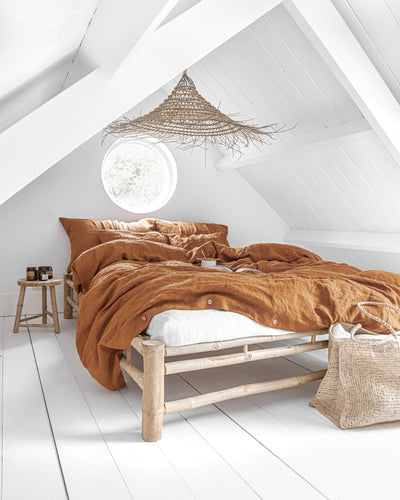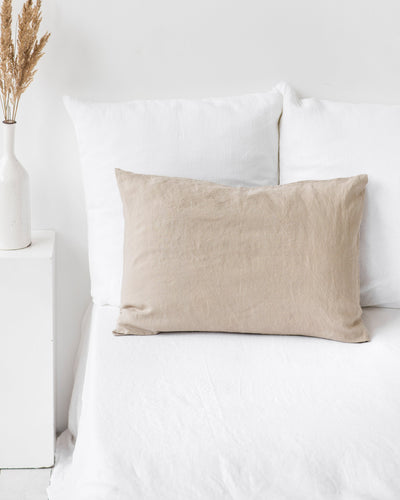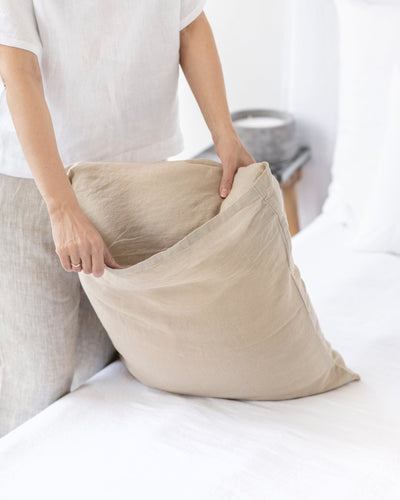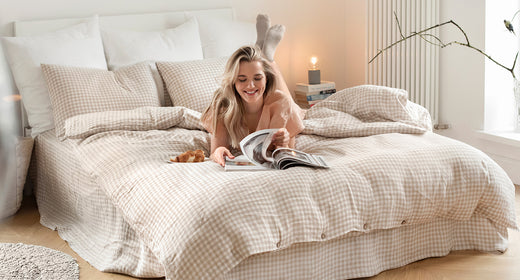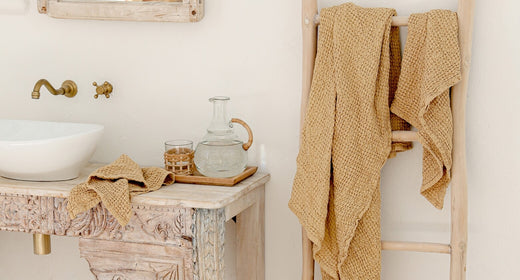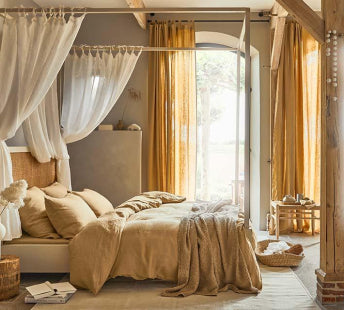Linen vs. Bamboo Sheets: Which One Is Right for You?

In the world of bedding, two types of sheets are garnering significant attention: linen and bamboo. Both have unique properties that cater to different sleep preferences, making the dilemma of linen vs. bamboo sheets an interesting one. As their popularity increases in the bedding market, many wonder which option is better. This article will explore the benefits, drawbacks, and main differences between linen and bamboo sheets to help you decide which is right for you.
Benefits of Linen vs. Bamboo Sheets
Linen and bamboo sheets each provide distinct advantages that enhance sleep quality and sustainability. Linen sheets are known for their breathability and durability, while bamboo sheets are prized for their softness and hypoallergenic properties. In the following paragraphs, we will delve into the specific benefits of each type of sheet to help you make an informed choice for your bedding needs.
Linen sheets
Here are the key benefits that make linen sheets a popular choice for many sleepers:
- Breathability and natural cooling properties: Linen sheets are renowned for their excellent breathability and natural cooling properties. Made from flax fibers, linen allows air to circulate freely, which helps regulate body temperature and prevent night sweats. This makes linen ideal for hot sleepers or those in warmer climates.
- Hypoallergenic and antibacterial benefits: Linen is naturally hypoallergenic and antibacterial. The flax fibers have inherent properties that resist allergens and bacteria, contributing to a healthier sleep environment. This can be particularly beneficial for individuals with allergies or sensitive skin.
- Aesthetic appeal and unique texture: Linen sheets have a distinctive texture and a rustic charm that many find appealing. Their slightly coarse feel adds a touch of luxury and sophistication to any bedroom. Over time, linen softens and develops a unique patina, enhancing its aesthetic appeal.
Bamboo sheets
The main benefits of bamboo sheets include:
- Softness and silky feel: Bamboo sheets are celebrated for their exceptional softness and silky feel. Their smooth texture often resembles that of high-thread-count cotton sheets, providing a cozy and comfortable sleeping experience.
- Moisture-wicking and thermal-regulating properties: Bamboo fibers excel at moisture-wicking, keeping you dry and comfortable throughout the night. They also have thermal-regulating properties, which help maintain an optimal sleeping temperature by adapting to your body heat.
- Hypoallergenic aspect: Bamboo sheets are naturally hypoallergenic, making them a great option for those with allergies.
Drawbacks of Linen vs. Bamboo Sheets
Lastly, before making a decision, it's equally important to consider the drawbacks of both linen and bamboo sheets:
Linen sheets

Despite the numerous advantages, there are some drawbacks to linen sheets that you should keep in mind:
- Initial roughness and stiffness: One common drawback of linen sheets is their initial roughness and stiffness. They require several washes to break in and reach their full softness potential.
- Higher price point: Linen sheets tend to be more expensive than other bedding materials. The higher price reflects the quality and durability of the fabric, but it may deter budget-conscious shoppers.
- Tendency to wrinkle easily: Linen is notorious for wrinkling easily. While some appreciate the relaxed, lived-in look of wrinkled linen, others may find the constant need for ironing or steaming inconvenient.
Bamboo sheets
Although bamboo sheets remain a popular choice for many, it's important to be aware of their potential drawbacks:
- Sustainability concerns: While bamboo is a sustainable resource, the production process of bamboo sheets can vary in terms of environmental impact. Some methods involve chemicals to break down the bamboo fibers, raising concerns about their overall sustainability.
- Possible pilling with lower-quality sheets: Lower-quality bamboo sheets are prone to pilling, compromising their smooth texture and appearance. Investing in high-quality bamboo sheets can mitigate this issue, but it's an important consideration.
- Higher cost compared to cotton: Bamboo sheets are generally more affordable than high-quality linen but more expensive than traditional cotton sheets. This mid-range price point might be a consideration for those weighing their budget against the benefits.
Main Differences Between Linen and Bamboo Sheets
It is essential to understand the differences in comfort, durability, care, cost, and environmental impact when deciding between linen and bamboo sheets.
Comfort and feel
Linen sheets boast a textured, slightly coarse feel that gradually softens with every wash, while their breathability and ability to adapt to body temperature make them perfect for hot climates or individuals who tend to sleep warm.
On the other hand, bamboo sheets provide an immediate silky-smooth, luxurious sensation, with their moisture-wicking and thermal-regulating features ensuring a comfortable sleep environment, promoting a cozy and refreshing night's rest.
Durability and longevity
When it comes to longevity, linen sheets are prized for their remarkable strength and durability, capable of enduring frequent washing and wear while growing softer and more comfortable with each use. Their longevity makes them a wise long-term investment, as high-quality linen sheets can withstand the test of time and provide years of luxurious sleep.
Conversely, bamboo sheets offer a good lifespan, although their durability is contingent upon the quality of the weave and manufacturing process. While superior bamboo sheets can endure for several years without notable wear, lower-quality options may be susceptible to pilling and diminished softness over time.
Care and maintenance
Linen sheets demand gentle maintenance to uphold their integrity, necessitating washing in cold water with a mild detergent and air-drying to safeguard their fibers. While ironing can mitigate wrinkles, some individuals opt for the natural, relaxed appearance of un-ironed linen.
In contrast, bamboo sheets offer a simpler care routine, as they can be machine-washed in cold water with a mild detergent. To preserve their softness and prevent pilling, it's advisable to refrain from using harsh chemicals and subjecting them to high heat during drying.
Cost and value

Linen sheets may come with a higher initial price tag, yet their exceptional durability and longevity render them a cost-effective option over time, as the reduced need for frequent replacements can balance out the initial investment.
On the other hand, bamboo sheets present good value for their price, typically being more budget-friendly compared to top-tier linen options while still delivering many of the same benefits.
Environmental impact
Linen production stands out for its eco-friendliness, as flax plants demand minimal water and pesticides, and linen itself is biodegradable, thus minimizing its environmental impact. These sustainability factors position linen sheets as a top choice for environmentally conscious consumers.
Meanwhile, bamboo cultivation boasts notable environmental advantages owing to its rapid growth and reduced pesticide requirements. However, the chemical processing involved in manufacturing bamboo sheets can pose sustainability challenges. Opting for bamboo sheets crafted through eco-friendly processes can help address these issues and ensure a more environmentally responsible choice.
Should I Get Linen or Bamboo Sheets?
Deciding between linen and bamboo sheets depends on your personal preferences and priorities. Linen is ideal for those who appreciate a textured, breathable fabric that adapts to body temperature, offering exceptional durability and longevity, softening and improving with each wash. However, it requires more careful maintenance, including gentle washing and air drying, and has a higher initial cost but offers long-term value. Linen is also highly sustainable, with eco-friendly production methods and biodegradability.
On the other hand, bamboo is perfect for those who prefer a silky-smooth, moisture-wicking fabric that feels luxurious. Bamboo sheets provide good durability, especially with higher quality sheets, but may experience pilling over time. They are relatively easy to care for, with simple washing instructions and minimal need for special treatment. They are more affordable upfront, providing good value. Bamboo is environmentally friendly in cultivation, but its sustainability can be affected by chemical processing methods.
Linen sheets are ideal for hot sleepers, eco-conscious consumers, and those who value durability. Bamboo sheets are perfect for comfort seekers and budget-conscious shoppers.
The Bottom Line
Both linen and bamboo sheets have unique benefits and drawbacks, catering to different sleep preferences and lifestyles. Whether you opt for the crisp, breathable feel of linen or the silky comfort of bamboo, you're choosing to align with your needs and values. Consider your priorities, such as comfort, durability, care, cost, and environmental impact, to make the best decision for your bedding.
Explore the wide selection of premium linen bedding at MAGICLINEN and elevate your sleep experience today!
Frequently Asked Questions (FAQs)
Are linen or bamboo sheets better?
The answer depends on personal preferences and needs. Linen sheets offer breathability and durability, while bamboo sheets provide softness and moisture-wicking properties.
Is linen or bamboo better for hot sleepers?
Both linen and bamboo sheets are suitable for hot sleepers due to their breathability and moisture management capabilities. Linen may have a slight edge in breathability.
Is linen more breathable than bamboo?
Linen is generally more breathable than bamboo, making it an excellent choice for warm climates or hot sleepers.
 United States
United States
